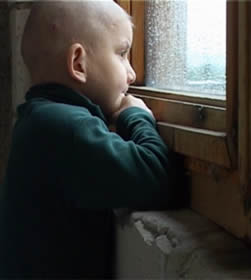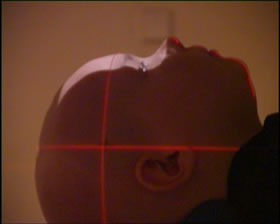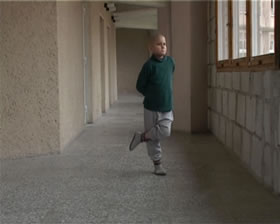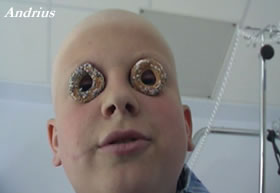Before Flying Back to the Earth, that has received a Directors Guild of America Award in 2007, is a gracefully expressive journey into the lives of children living with leukemia at a pediatric hospital in Vilnius, Lithuania. The children enter into an alien world, bereft of color and warmth, but populated with kind strangers. Their new toys are invented out of stainless steel, and new friendships are formed in the crucible of the cancer ward. Inured to the routine of daily medication and meals that alternate between porridge and cabbage soup, the children dream of life beyond the clinic’s thick cement walls while their parents bear the burden of uncertainty about their children’s fate.
 Arunas Matelis is a representative of the new generation of Lithuanian filmmakers. The first Arunas’ doc “Ten Minutes Before the Flight of Icarus” (1990) received numerous awards.
Arunas Matelis is a representative of the new generation of Lithuanian filmmakers. The first Arunas’ doc “Ten Minutes Before the Flight of Icarus” (1990) received numerous awards.
Films directed by Arunas Matelis were awarded or screened in many world wide film festivals like:; Cannes (“Directors’ fortnight” and “Critics’ Week”), Rotterdam, Torino, San Paulo , Oberhauzen, Amsterdam / IDFA , Leipzig and others.
A.Matelis directed nine short documentaries prior to Before Flying Back to the Earth, his first feature doc. Before Flying Back to the Earth became one of the very few films in the world, which received 10 awards within less than one year of it’s first screening and among them most important in European documentary field like : “Silver Wolf” – International Documentary Festival Amsterdam / IDFA 2005; “Golden Dove” – International Leipzig Festival 2005; European Film Academy nomination for “The Best European Doc 2005” even before of official premier of the film; The Best Lithuanian Film 2005; Honorable mention of jury – SILVERDOCS (Silver Spring) 2006 ; Spirit award for DOC – international Brooklyn film festival 2006; „Big Stamp Award” main award in Zagreb DOX 2006; First Prize –main award – Documenta Madrid 2006; Lithuanian National Culture and Art Award; Grand Prix – Parnu international documentary festival .
Bijan Tehrani: For making the Flying Back to the Earth you went back to the children hospital that your daughter was hospitalized  for Leukemia. How difficult was it to go back there? Most of the people even if like your daughter’s case, their loved one is cured, never want to witness the same experience they had again.
for Leukemia. How difficult was it to go back there? Most of the people even if like your daughter’s case, their loved one is cured, never want to witness the same experience they had again.
Arunas Matelis: I do not have a simple answer to this. On one hand, of course, it is difficult there and people avoid such confrontation, but on the other hand, my family‘s experience in this hospital left a most significant mark in me. Here, as nowhere else, you realize how strong and powerful a man can be, how big love is and how close the God sometimes is. Besides, we never really separated from the hospital; after completing the treatment here we still need to come here for several years to have tests. Besides, we became members of a charity organization, which is established here. I clearly felt and understood that telling about my experience in the hospital is my duty and my privilege.
I did not have any doubts that these experiences are worth to be captured on a film tape and told to others who are on the other side of the hospital walls. People often get back to their strongest impressions and the most important of their discoveries.
Bijan: Did you decide about making Before Flying Back to the Earth during the time that you were with your child at the hospital or after that? How was your first encounter with the kids at the hospital when you went there for the first time?  Arunas: When the circumstances of life brought us to the hospital, the most important things for me and everyone here at the time were prayers and taking care of the family. Everybody here is in a similar situation – one of the parents has to leave his or her work and devote oneself to taking care of the child at the hospital, the other one has to take care of those left at home. Under such circumstances it would be difficult to take up camera because a lot of things do not have the meaning they use to have. Certain period of time and distance were needed for the film to be born. Even when we started shooting I was not certain that the film will be made. I said to my colleagues: “We are not going there to make a film. Perhaps for the first and maybe the only time in our life we can come here to understand the great value of human understanding, compassion, life and dedication. If we can see the meaning in being here, we can talk about the film, if not, there will be no film.” Couple of months passed until we realized that the people in the hospital need us and they can give us incredible lessons of life. That’s how the film started. Very gradually, camera became an instrument of play and work for all of us. It became a natural witness to and a part of the life in the hospital.
Arunas: When the circumstances of life brought us to the hospital, the most important things for me and everyone here at the time were prayers and taking care of the family. Everybody here is in a similar situation – one of the parents has to leave his or her work and devote oneself to taking care of the child at the hospital, the other one has to take care of those left at home. Under such circumstances it would be difficult to take up camera because a lot of things do not have the meaning they use to have. Certain period of time and distance were needed for the film to be born. Even when we started shooting I was not certain that the film will be made. I said to my colleagues: “We are not going there to make a film. Perhaps for the first and maybe the only time in our life we can come here to understand the great value of human understanding, compassion, life and dedication. If we can see the meaning in being here, we can talk about the film, if not, there will be no film.” Couple of months passed until we realized that the people in the hospital need us and they can give us incredible lessons of life. That’s how the film started. Very gradually, camera became an instrument of play and work for all of us. It became a natural witness to and a part of the life in the hospital.
Bijan: Your work as a film director is admirable; you have created a visual poem about pains, dreams and hopes. Do you see Before Flying Back to the Earth leaving the audience with a positive impact?
Aronas: Thanks for these nice words. Yes, and even more than that. The reaction of the audience is both unexpected and very moving. Somebody said to me: “After this film, I’m ashamed to complain about life.” Once my daughter told me after school that her friend’s father, having seen the film at the cinema, decided to become a blood donor; one Dutch family after seeing the film decided to ask their friends instead of bringing presents for their new-born girl to donate to the sick children, and sent us a message asking for the bank account number of the hospital; a group of very honorable and famous Japanese artists, entrepreneurs and politicians not only came to Lithuania with charity for this particular hospital but also spent the night at the hotel fording paper birds of hope and love that were delivered to the children next morning. These were really very special evaluations of the film that exceeded my expectations.
“After this film, I’m ashamed to complain about life.” Once my daughter told me after school that her friend’s father, having seen the film at the cinema, decided to become a blood donor; one Dutch family after seeing the film decided to ask their friends instead of bringing presents for their new-born girl to donate to the sick children, and sent us a message asking for the bank account number of the hospital; a group of very honorable and famous Japanese artists, entrepreneurs and politicians not only came to Lithuania with charity for this particular hospital but also spent the night at the hotel fording paper birds of hope and love that were delivered to the children next morning. These were really very special evaluations of the film that exceeded my expectations.
Bijan: How the children in the hospital reacted when you went back there to shoot Before Flying Back to the Earth?
Arunas: I was acquainted with some of them earlier, some of them I didn’t know. I agreed with them and their parents that I do not want to make a film about them but we together can make a film about us. As the parents said, camera became like a wonderful toy for the children, bringing lots of joy to their life at the hospital.
Bijan: Did you talk to your daughter about making this movie? Has she seen the movie? What has been the reaction of the kids at the hospital and other kids to Before Flying Back to the Earth?
Arunas: The children who are in the film laughed and saw many more funny moments in it than, for instance, the doctors who probably for the first time found themselves as if on the other side. Perhaps the film became a replacement for words about the life over there both for me and for them. We sometimes talk both about the film and about the hospital, although this talking is rather subtle. We respect each others zone of silence and willingness to keep silent about it. For instance, my daughter started talking to her doctor only after some years. Even this “talking” was limited to merely saying “Good bye!”
Somehow I find it difficult to talk about their evaluations in my own words. The film is intended for children who are a bit older than ten years and it became rather close to the hearts of the senior school-children. Many schools took it as a cinematic lesson of kindness and love, part of them, which was also unexpected, said that this was the best film ever seen.
Bijan: How did you come up with the visual style of the movie?
Arunas: It took a lot of time to find the light, which I felt but was failing to create. On the other side, I needed that even this dilapidated wall of the hospital, the buckets with food and the strange machinery (resembling a submarine) became close, nice-looking and attractive, and eliminated the barrier between the screen and the audience to disperse the possible feeling of scare, which invades when stepping in there, to transform the initial outward ugliness of the things into certain esthetic enjoyment or even grow into their beauty. Of course, it was extremely important for me to use the episodes filmed by the children, especially by Andrius, when the film crew is gone. This is kind of discussion and community of two outlooks on the reality.
 Bijan: What were the challenges you faced while making your movie?
Bijan: What were the challenges you faced while making your movie?
Arunas: In such a film you can not be making a film about others. You have to become a part of all this, and at the same time, those who are on the other side of the camera become close and dear to you. And every success of theirs is a joy for you, and every moment of pain becomes a moment of pain for you.
Bijan: Who are the film makers that you admire?
Arunas: There are so many of them that by naming just some I would not be fair in respect of the entire army of genial film-making artists.
Bijan: What inspired you to become a filmmaker?
Arunas: Wonderful films and the feeling that those 25 frames per second can actually change the world. Although the way was not a simple one – I had to abandon my almost-obtained profession, applied mathematics (my parents’ dream!), and as a consequence, try to escape the service in the Soviet Army, which at the time was involved in the war in Afghanistan. By this act, in the eyes of my parents and relatives, I completely ruined my future and career and doomed myself to be in touch  of the soviet system. This was the first price of becoming a film-maker, just attempting to take the exams to the film directors’ course.
of the soviet system. This was the first price of becoming a film-maker, just attempting to take the exams to the film directors’ course.
Bijan: Please tell us about your future projects.
Arunas: A colleague of mine said that after this film I “will have to recharge my internal batteries” for the same period of time it took to make it. I was exited when I calculated how much holidays I am entitled to, but the time is running out… Since there is no film yet, words seem like a tricksters because they speak of the ephemery that does not exist yet; besides, sometimes words can scare a new and yet-to-be-born film.
Bijan: Thank you for your time.

